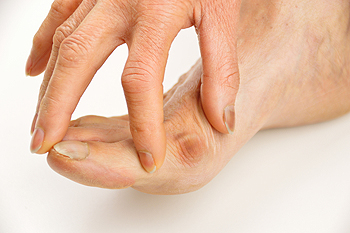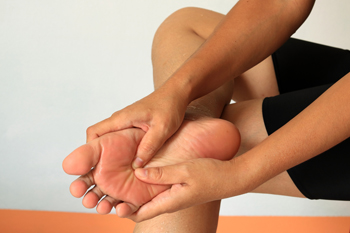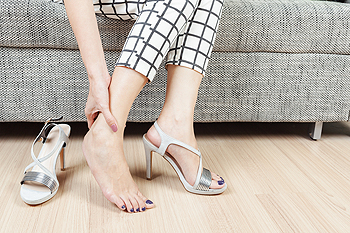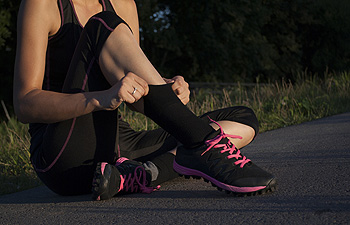September 2020
Heel Pain Can Be Treated!
Different Shoes For Various Sporting Activities
The type of shoes that are worn is important to consider while working out. An exercise routine may be hindered if shoes do not fit correctly, and potential foot problems may develop. There are different types of shoes that can be purchased for various sporting activities. Runners will benefit by knowing the amount of shock absorption that is needed, in addition to observing how the feet make contact with the ground. This can be identified by looking at old shoes, and noticing wear and tear patterns. For people that enjoy hiking, boots may be a better option than running shoes. It is beneficial if they are made of waterproof materials, and have adequate cushioning. If you have any questions about what type of shoes to purchase for preferred sporting activities, please consult with a podiatrist who can help you to make the right choices.
It is important to find shoes that fit you properly in order to avoid a variety of different foot problems. For more information about treatment, contact Dr. Stephen Petrofsky from Florida. Our doctor will treat your foot and ankle needs.
Proper Shoe Fitting
Shoes have many different functions. They cushion our body weight, protect our feet, and allow us to safely play sports. You should always make sure that the shoes you wear fit you properly in order to avoid injuries and deformities such as: bunions, corns, calluses, hammertoes, plantar fasciitis, stress fractures, and more. It is important to note that although a certain pair of shoes might be a great fit for someone else, that doesn’t mean they will be a great fit for you. This is why you should always try on shoes before buying them to make sure they are worth the investment. Typically, shoes need to be replaced ever six months to one year of regular use.
Tips for Proper Shoe Fitting
- Select a shoe that is shaped like your foot
- Don’t buy shoes that fit too tight, expecting them to stretch to fit
- Make sure there is enough space (3/8” to ½”) for your longest toe at the end of each shoe when you are standing up
- Walk in the shoes to make sure they fit and feel right
- Don’t select shoes by the size marked inside the shoe, but by how the shoe fits your foot
The shoes you buy should always feel as good as they look. Shoes that fit properly will last longer, feel better, and improve your way of life each day.
If you have any questions, please feel free to contact our office located in Port Charlotte, FL . We offer the newest diagnostic and treatment technologies for all your foot care needs.
Possible Causes of Bunions
 The medical condition that is referred to as arthritis may contribute to the development of bunions. Additionally, bunions can occur due to genetic factors, or from wearing shoes that do not have enough room for the toes to move freely in. Bunions are defined as bony growths that form on the side of the big toe and can cause pain and discomfort. Mild relief may be found when a protective pad is worn over the bunion, and larger shoes may need to be purchased. An X-ray may be performed to determine the severity of the bunion, and if it is large, and affects daily activities, surgery may be necessary for permanent removal. If you have developed a bunion, please consult with a podiatrist who can determine what the best course of treatment is for you.
The medical condition that is referred to as arthritis may contribute to the development of bunions. Additionally, bunions can occur due to genetic factors, or from wearing shoes that do not have enough room for the toes to move freely in. Bunions are defined as bony growths that form on the side of the big toe and can cause pain and discomfort. Mild relief may be found when a protective pad is worn over the bunion, and larger shoes may need to be purchased. An X-ray may be performed to determine the severity of the bunion, and if it is large, and affects daily activities, surgery may be necessary for permanent removal. If you have developed a bunion, please consult with a podiatrist who can determine what the best course of treatment is for you.
If you are suffering from bunion pain, contact Dr. Stephen Petrofsky of Florida. Our doctor can provide the care you need to keep you pain-free and on your feet.
What Is a Bunion?
Bunions are painful bony bumps that usually develop on the inside of the foot at the joint of the big toe. As the deformity increases over time, it may become painful to walk and wear shoes. Women are more likely to exacerbate existing bunions since they often wear tight, narrow shoes that shift their toes together. Bunion pain can be relieved by wearing wider shoes with enough room for the toes.
Causes
- Genetics – some people inherit feet that are more prone to bunion development
- Inflammatory Conditions - rheumatoid arthritis and polio may cause bunion development
Symptoms
- Redness and inflammation
- Pain and tenderness
- Callus or corns on the bump
- Restricted motion in the big toe
In order to diagnose your bunion, your podiatrist may ask about your medical history, symptoms, and general health. Your doctor might also order an x-ray to take a closer look at your feet. Nonsurgical treatment options include orthotics, padding, icing, changes in footwear, and medication. If nonsurgical treatments don’t alleviate your bunion pain, surgery may be necessary.
If you have any questions, please feel free to contact our office located in Port Charlotte, FL . We offer the newest diagnostic and treatment technologies for all your foot care needs.
Signs of Peripheral Neuropathy
 Did you know that approximately half of all people with diabetes have some type of nerve damage? One of the most common types is peripheral neuropathy. Peripheral neuropathy typically starts in the nerves of the feet, and can affect both feet at once. The typical symptoms of peripheral neuropathy are tingling or a “pins and needles” sensation in the feet, foot pain or increased sensitivity, numbness and weakness in the feet, changes in the shape of the foot muscles and bones, and the appearance of open sores on the feet. Often, the symptoms are worse at night than they are during the day. If you are experiencing the symptoms of peripheral neuropathy, don’t ignore them. Schedule a visit with a podiatrist, who can help you maintain the health of your feet.
Did you know that approximately half of all people with diabetes have some type of nerve damage? One of the most common types is peripheral neuropathy. Peripheral neuropathy typically starts in the nerves of the feet, and can affect both feet at once. The typical symptoms of peripheral neuropathy are tingling or a “pins and needles” sensation in the feet, foot pain or increased sensitivity, numbness and weakness in the feet, changes in the shape of the foot muscles and bones, and the appearance of open sores on the feet. Often, the symptoms are worse at night than they are during the day. If you are experiencing the symptoms of peripheral neuropathy, don’t ignore them. Schedule a visit with a podiatrist, who can help you maintain the health of your feet.
Neuropathy
Neuropathy can be a potentially serious condition, especially if it is left undiagnosed. If you have any concerns that you may be experiencing nerve loss in your feet, consult with Dr. Stephen Petrofsky from Florida. Our doctor will assess your condition and provide you with quality foot and ankle treatment for neuropathy.
What Is Neuropathy?
Neuropathy is a condition that leads to damage to the nerves in the body. Peripheral neuropathy, or neuropathy that affects your peripheral nervous system, usually occurs in the feet. Neuropathy can be triggered by a number of different causes. Such causes include diabetes, infections, cancers, disorders, and toxic substances.
Symptoms of Neuropathy Include:
- Numbness
- Sensation loss
- Prickling and tingling sensations
- Throbbing, freezing, burning pains
- Muscle weakness
Those with diabetes are at serious risk due to being unable to feel an ulcer on their feet. Diabetics usually also suffer from poor blood circulation. This can lead to the wound not healing, infections occurring, and the limb may have to be amputated.
Treatment
To treat neuropathy in the foot, podiatrists will first diagnose the cause of the neuropathy. Figuring out the underlying cause of the neuropathy will allow the podiatrist to prescribe the best treatment, whether it be caused by diabetes, toxic substance exposure, infection, etc. If the nerve has not died, then it’s possible that sensation may be able to return to the foot.
Pain medication may be issued for pain. Electrical nerve stimulation can be used to stimulate nerves. If the neuropathy is caused from pressure on the nerves, then surgery may be necessary.
If you have any questions, please feel free to contact our office located in Port Charlotte, FL . We offer the newest diagnostic and treatment technologies for all your foot care needs.
The Harm in High Heels
 High heels are a wardrobe staple for many, however, wearing high heels can have serious consequences for foot health. A study on foot and ankle injuries in the U.S. found that between 2002 and 2012, U.S. emergency rooms treated 123,355 high heel-related injuries. Strains and sprains of the foot and ankle were the most common of these injuries, and about 20% of them involved broken bones. Another study, this time looking at South Korean flight attendants who were required to wear high heels daily for work, found that their balance decreased over time due to a loss of strength in the muscles and tendons that support the front-to-back movement of the foot. If you do wear high heels, it is recommended that you wear them less frequently, and that you give your feet a break by taking the high heels off to stretch your feet and ankles or by switching to running shoes. For more information on the connection between footwear and foot health, speak with a podiatrist today.
High heels are a wardrobe staple for many, however, wearing high heels can have serious consequences for foot health. A study on foot and ankle injuries in the U.S. found that between 2002 and 2012, U.S. emergency rooms treated 123,355 high heel-related injuries. Strains and sprains of the foot and ankle were the most common of these injuries, and about 20% of them involved broken bones. Another study, this time looking at South Korean flight attendants who were required to wear high heels daily for work, found that their balance decreased over time due to a loss of strength in the muscles and tendons that support the front-to-back movement of the foot. If you do wear high heels, it is recommended that you wear them less frequently, and that you give your feet a break by taking the high heels off to stretch your feet and ankles or by switching to running shoes. For more information on the connection between footwear and foot health, speak with a podiatrist today.
High heels have a history of causing foot and ankle problems. If you have any concerns about your feet or ankles, contact Dr. Stephen Petrofsky from Florida. Our doctor can provide the care you need to keep you pain-free and on your feet.
Effects of High Heels on the Feet
High heels are popular shoes among women because of their many styles and societal appeal. Despite this, high heels can still cause many health problems if worn too frequently.
Which Parts of My Body Will Be Affected by High Heels?
- Ankle Joints
- Achilles Tendon – May shorten and stiffen with prolonged wear
- Balls of the Feet
- Knees – Heels cause the knees to bend constantly, creating stress on them
- Back – They decrease the spine’s ability to absorb shock, which may lead to back pain. The vertebrae of the lower back may compress.
What Kinds of Foot Problems Can Develop from Wearing High Heels?
- Corns
- Calluses
- Hammertoe
- Bunions
- Morton’s Neuroma
- Plantar Fasciitis
How Can I Still Wear High Heels and Maintain Foot Health?
If you want to wear high heeled shoes, make sure that you are not wearing them every day, as this will help prevent long term physical problems. Try wearing thicker heels as opposed to stilettos to distribute weight more evenly across the feet. Always make sure you are wearing the proper shoes for the right occasion, such as sneakers for exercising. If you walk to work, try carrying your heels with you and changing into them once you arrive at work. Adding inserts to your heels can help cushion your feet and absorb shock. Full foot inserts or metatarsal pads are available.
If you have any questions please feel free to contact our office located in Port Charlotte, FL . We offer the newest diagnostic and treatment technologies for all your foot and ankle needs.








